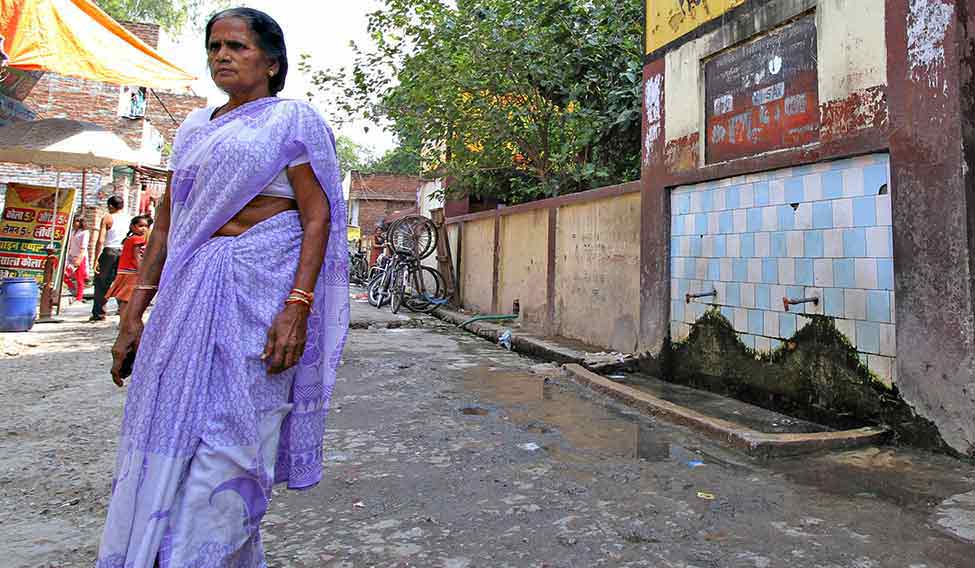Kalavati would be an ideal brand ambassador for the prime minister’s cleanliness campaign of Swachh Bharat Abhiyan. Despite being illiterate, she has been working against open defecation by helping build more than 800 toilets in the slums of Kanpur. This soft-spoken woman made sanitation the mission of her life more than a quarter of a century ago, moved as she was by was the plight of the people of her locality, Raja ka Purwa, a central Kanpur slum with a population of 8,000. “Back then, there was not a single toilet in the area and all the women defecated in the open,” says Kalavati, 60. “As a result, no father would want his daughter married to a boy from the area. People would come to see the groom and fix a date but, more often than not, would call off the wedding. Moreover, women could rarely relieve themselves in peace. They often endured harassment and sexual abuse when defecating in the open.”
Once, an elderly woman on her way to answer the call of nature was killed by a speeding train while crossing the railway tracks. The incident made Kalavati think of a solution to the problem, but she knew building toilets was not easy. “Initially, everyone made fun of my idea,” she says. “They said that many leaders had tried to build toilets, but failed. Desperate locals had demanded that the authorities build toilets. They had gone on a fast and had held dharnas, but to no avail. So, they wondered what an illiterate, poor woman like me could do. But I was determined. So Kalavati approached the municipal corporation with a proposal to build a community toilet in the area. Though she was initially told that it did not have adequate funds, after much persuasion, the commissioner agreed to sanction Rs.2 lakh for the project. Kalavati also urged the residents of Raja ka Purwa to contribute. Each family contributed what it could; better-off families gave Rs.200; less well-off ones, $100; and extremely poor ones, Rs.50. She managed to collect Rs.1.25 lakh from the residents, but some doubted her intentions. “To quell their suspicions, I called a community meeting and promised to return each family’s contribution if I failed to build the toilet,” says Kalavati, who also touched rickshaw pullers and even ragpickers for funds. She felt if everyone contributed, there would be a collective sense of participation. Local NGO Shramik Bharti, which works for sanitation, offered labour. And, Kalavati got a 50-seater community toilet built. “It was a great relief for all of us, particularly the women, and it stopped open defecation to a large extent,” says a resident.
Buoyed by the success, Kalavati collected more funds and built a bathroom and two tanks that supplied water to every house and to a small school in the area. The residents admired Kalavati’s tenacity and feted her.
Kalavati did a lot of the masonry work herself. “I enjoyed laying bricks and fixing toilet seats,” she says. “I then started procuring materials and inspecting the work of other masons to ensure that quality materials were used for construction.” Noting Kalavati’s keen interest in masonry, Shramik Bharti sent her to a training programme in toilet construction. Kalavati says she has personally built more than 50 small toilets and fixed more than 250 toilet seats.
What she achieved in Raja ka Purwa, Kalavati has successfully replicated in Rakhi ki Mandi. Situated in Jhakarkati, near the railway station, Rakhi ki Mandi with a population of 10,000 had no toilets till three years ago. “It was hell on earth,” says a resident. “Open defecation was common, and drains overflowed with sewage and faeces. The stench was unbearable and conditions were terribly unhygienic. It was difficult to sit in the open before Kalavati came here.”
Again, Shramik Bharti provided labour. The residents say that more than 400 toilets have been built in Rakhi ki Mandi in three years. Soak pits have also been built to arrest the flow of dirty water. “Now, at least, we can sit outside comfortably,” says Rabia, a resident. “Thanks to Kalavati’s efforts, the stench has gone and there are no overflowing drains.”
Kalavati, who is affectionately called didi, was born into an agricultural family in UP’s Sitapur district and moved to Kanpur after marriage. She has been estranged from her husband for more than 20 years. Both her daughters are married; one lives close by. “I have no regular source of income,” says Kalavati. “I had some savings, which I spent on my daughters’ weddings. My well-wishers take care of me. They get me clothes and other essentials.” She dropped her surname, Singh, when she started building toilets. “Some people advised I keep my surname as it showed that I was from an upper-caste family. However, since my mission required me to include people from all castes, I decided to drop it so that everyone could interact with me freely.” For the past seven years, she hasn’t constructed toilets by herself; she now trains and supervises the masons. Kalavati, who dreams of a toilet in every house in Kanpur, says she will continue the work for the rest of her life. “I have high respect for my work,” she says. “It has given me immense satisfaction. The satisfaction of cleaning the environment and ensuring respect for women.”







